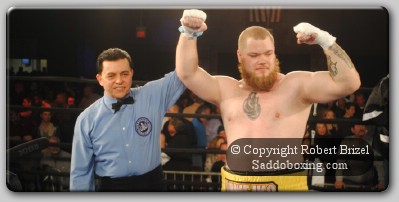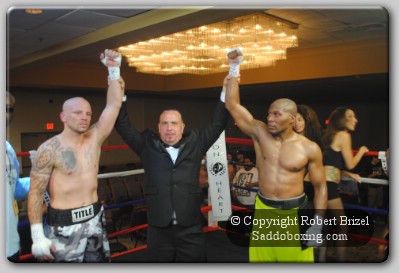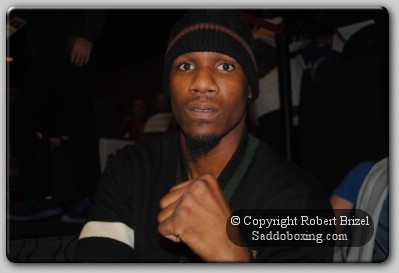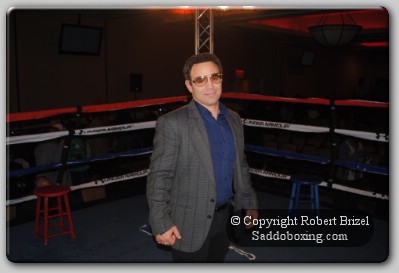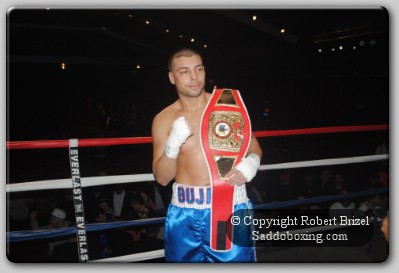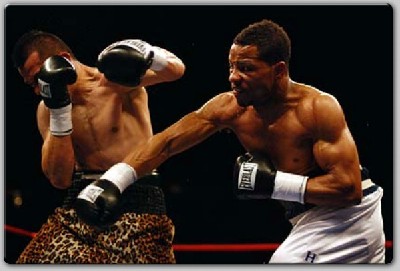
© Jon Swenson / InPhotography.com
Karim Mayfield is not quite your ordinary welterweight, mainly because of the late start he has gotten in the sport. Karim, who did not have his first amateur bout until he was 20 then turned pro at 24, has done his best to make up for lost time. While he only has 12 bouts on his resume thus far, he has won all 12 with seven by way of knockout.
Karim has also started to develop himself a reputation as a “spoiler” of sorts. Since turning pro he has faced undefeated opponents Alejo Sepulveda, Rahman Yusubov, Francisco Santana and Mario Alberto Lozano. Yusubov was a highly touted Don King prospect when they faced off and Santana was a Goossen-Tutor hopeful that fell not once but twice to the hands of Mayfield.
One thing that I learned early from my discussion with Karim is that this young man is not only eager and ready to make his name one to remember for years to come but he is also a fighter that knows to be successful one must be willing to learn the trade well and never take shortcuts.
The San Francisco Bay native was kind enough to take time out to speak with me this past weekend after a hard fought victory over rugged veteran Mario Ramos on March 19th at the Grand Sierra Resort Casino in Reno, NV.
Ramos, 17-6-1 going into the bout and who had taken well known names such as Demetrius Hopkins, Lamont Peterson, Antonio Diaz and Henry Bruseles to the limit, was just the latest of an ever growing list of opponents that found out the hard way that Karim Mayfield is for real.
This is what Mayfield had to say about his victory, his next step, plans for the future and more, only at SaddoBoxing.
SaddoBoxing: How do you feel after defeating a much more experienced opponent?
Karim Mayfield: “I feel good; this fight was a confidence builder for me. I wish I could have done a bit more in the fight because I really wanted a stoppage win but this guy had been in with some much more experienced fighters before he faced me and went the distance so I can’t be too disappointed. It was a good win though.”
SB: You were slated to fight Jason Davis originally but he was replaced with Mario Ramos on short notice. Mario is an experienced fighter with a tough chin who has been the distance with guys like Devon Alexander and Lamont Peterson. I read in a prior interview where you stated you wanted to make a statement in that fight. Did the fact he had been in with those more experienced fighters and gone the distance put any added pressure on you?
KM: “Yes it did, it was like when I had fought Roberto Valenzuela, another fighter with a lot of experience. He had fought Andre Berto sometime prior to when I had faced him and was stopped by Berto in the first round I think. Knowing this I wanted to also score a stoppage, knowing how high a KO ratio Berto had I wanted to see if I could stop him quicker. He was more durable then I had thought, I was winging punches too much and broke my hand. I stopped him in the second round but I had put the added pressure on myself and was a bit disappointed.”
SB: You’re somewhat of a late comer to the sport, especially at the weight class you compete in. You started as an amateur when you were 20, then at 24 you turned pro. What made you decide to take up the sport at that age? Most fighters begin their amateur career in their early teens then turn pro later on.
KM: Well, chronologically (laughs) it was put into perspective to me this way by a friend of mine Brian McGuire and switched around a bit when I first started. While some of those guys have been fighting a lot longer as an amateur and have 100-200 fights before turning pro, some of them are war torn from so many bouts. If I put in hard work and I am willing to learn, I could turn into a good fighter without such a long amateur career.
“Sparring more experienced guys, putting in the work at the gym, and gaining experience at the Golden Gloves, I made it to the Olympic trials and even earned a Bronze Medal, which meant a lot to me. I was advised that if I was going to turn pro, don’t go back out for a spot on the next Olympic team just use the experience gained. I mean, when [Bernard] Hopkins was 35 they said he was getting old but here he still is today going strong. So, I am not putting too much emphasis or worries on my age. ”
SB: How many amateur bouts did you have?
KM: “I had a total of 65.”
SB: Getting back to your most recent opponent, Mario Ramos, and the fact he was a somewhat late replacement for Jason Davis, that was not a situation you were unaccustomed to. Early on you had several other replacement opponents in Rahman Yusubov, a Don King prospect at the time and Francisco Santana, a Goossen prospect; both were undefeated when you met them but both walked away with their zero missing. You’re developing a slight reputation as a spoiler for these fellows. Do you like the added pressure?
KM: “It motivates me even more because I know that when you face a guy who is undefeated, that undefeated record means everything to him. You know he is going to put everything he has into that fight, that guy is going to be a force to be reckoned with to the best of his ability. So I know I need to be at my complete best. In those other fights, I was being brought in as an opponent for the promoter’s prospect to shine. Knowing that and coming out ahead in those fights shows I am not just coming in to be a name on a resume, it inspires me to do even better the next time.
SB: While seven of your 12 wins have come by stoppage, what type of fighter do you consider yourself? A puncher, boxer puncher or are you still developing the final product?
KM: “I am still developing, but I like to be a boxer puncher. I like to go forward and be on the attack, but it also depends on the opponent. You have to be able to make adjustments, sometime you can go forward and punch but sometimes you need to be able to punch and different angles, move around your opponent when hitting.”
SB: You are in a hectic division; the sport’s best or most dangerous lurk in on or around 147. Manny Pacquiao, Miguel Cotto, Shane Mosley and Joshua Clottey are around the top and then you have names such as Andre Berto, Luis Collazo, Kermit Cintron not far behind. How long do you think it will be before your name is among those mentioned?
KM: “I feel soon. If I can keep winning and improving, one of the sanctioning bodies will recognize me and say ‘This guy deserves a shot’. I like to check on my former opponents and see how they are progressing; the ones that are still doing well helps me judge where I am heading. I am not going to say that tomorrow it is going to happen, but soon if I do well enough and hopefully after 18 or 19 fights I get my chance, then you will hear my name among the other top fighters in the sport.”
SB: You have some sparring time in with Shane Mosley and Ricky Hatton. Did you learn anything from sparring with them that you have been able to carry over into your fights?
KM: “Good question for sure. I actually sparred with Antonio Margarito before Shane. He had to be like 175-180 lb when he first came to camp and started sparring, here I am at 150 lb soaking wet and had not fought in seven or eight months. I had done most my sparring at the local gym against guys that were either younger, guys starting out or guys that were average and now here I am sparring with world champions! Big difference (laughs).
“I thought Margarito was going to take my head off; I didn’t do too well at first. I learned and used time management, though. I paid attention to things. Day two I was a bit better and by day three, I was holding my own. It took a couple of days for to me to figure out what it would have taken a world champion two rounds but when I did, it gave me confidence to be in there with guys more experienced, who have had more fights, are on that championship level and not get beaten too badly at such an early stage of my career.
“If I had the strength trainers, nutritionist and other advantages in my career that those guys do, I could only imagine how I would be progressing.”
SB: While it is every fighter’s goal to be a world champion, often fighters either rush themselves or are rushed by their management team prematurely. I read something in another interview you conducted where the writer asked where you think you will be in 12 months. I was impressed with your answer of hopefully holding a minor title. Many guys would have replied ‘Hopefully fighting for a world title’ or ‘Hopefully I will be world champion’. Do you have a specific game plan for your career future?
KM: “I do, I want to be able to know I can deal with different in ring situations before that happened, like the issues with opponents being switched, knowing I can handle those things without a problem. I don’t want to end up finding out I wasn’t ready for something when I thought I was. I have to keep taking steps up, not putting too much pressure on myself but being realistic and not trying to do it all at one time.”
SB: Are you planning to stay at 147 or move up? Is this your ideal weight?
KM: “This is good for me; I could even drop down to 140 and compete. I stay in the gym a lot so I really don’t gain much weight between fights.”
SB: What is your walking around weight between fights, if you have taken some time off from the gym?
KM: “If I am taking a week or two off and not training for a fight, I go maybe 153-154 lb so I know I can make 140. I used to fight at 140 when in the Golden Gloves.”
SB: Karim, thank you for your time, congratulations on your win and I hope we can do this again in the future with a title belt around your waist.
KM: “Thank you, and I hope so.”
 Boxing News Boxing News
Boxing News Boxing News
